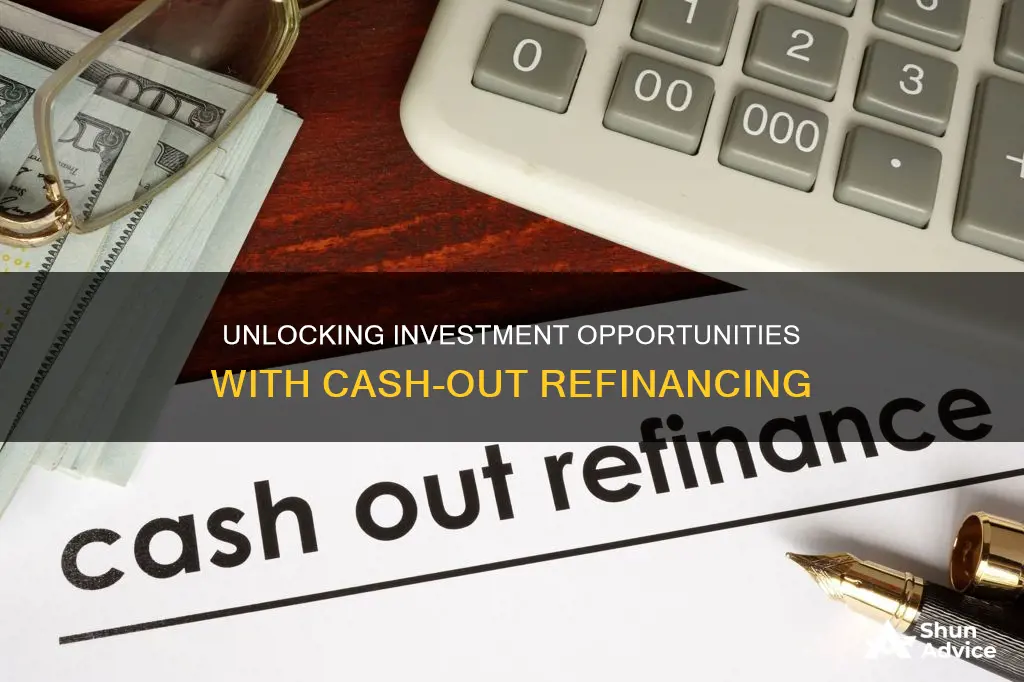
Cash-out refinancing is a way to replace your current mortgage with a new, larger mortgage that converts some of your home equity into cash. This cash can be used for anything, including investing in stocks or real estate. However, it's important to remember that investing is inherently risky and there is no guarantee of gains. While it might be tempting to cash out your home equity to invest, especially when mortgage rates are low, it's crucial to carefully consider the potential benefits and risks before making a decision.
| Characteristics | Values |
|---|---|
| Definition | A cash-out refinance is the process of replacing your current mortgage with a new, bigger mortgage for the remaining balance of the original loan plus cash from your home’s equity. |
| Use of cash | The cash can be used for any purpose, including funding an investment, home remodelling, debt consolidation, college tuition, etc. |
| Pros | The cash can be used to fund an emergency fund, retirement fund, or college fund. It can also be used to pay off higher-interest debt. |
| Cons | The process can be time-consuming and costly. There is a risk of losing money in the stock market and an increase in foreclosure risk. It can also complicate your finances. |
| Requirements | Credit score of at least 620, debt-to-income ratio no higher than 50%, and enough home equity to still have 20% after cashing out. |
What You'll Learn

Investing in the stock market
A cash-out refinance allows you to borrow more than you currently owe on your mortgage and keep the difference as cash. This can be used to invest in the stock market, but it is a risky move as there are no guarantees when it comes to stocks, and you could lose a lot of money.
There are some potential benefits to this strategy. If you have a solid income, low expenses, and are young, you may be in a position to ride out any stock price drops. The cost of borrowing may also be lower if you can deduct mortgage interest, and the average return on stocks since 1926 is 10%, while mortgage rates are typically lower.
However, there are also several drawbacks and risks to consider. Cash-out refinancing is a secured loan, so if you can't make the payments, you could lose your home. It also lowers your home equity, which could reduce your profit if you plan to sell soon. Additionally, the cost of cash-out refinancing is typically higher than rate-and-term refinancing, and you may be extending the repayment period, which can cost more over the life of the loan.
If you are considering a cash-out refinance to invest in the stock market, it is essential to weigh the pros and cons carefully and ensure you are financially prepared for any challenges and market downturns. It is also a good idea to speak with a financial advisor or mortgage professional to evaluate your options and ensure it is the best move for your financial portfolio.
Strategies to Maximize Cash Investments in Just One Year
You may want to see also

Investing in real estate
Building Equity
Before considering a cash-out refinance, it's important to build significant equity in your property. This can be achieved by paying your mortgage on time and owning the property for several years. Equity is the difference between the current value of your property and the balance of your existing mortgage. Most lenders require a minimum of 25% equity in the property before considering a cash-out refinance.
Interest Rates and Fees
When investing in real estate through a cash-out refinance, it's important to understand that interest rates and fees for investment properties are typically higher than for primary residences. This is because lenders view investment properties as higher-risk endeavours. Interest rates for cash-out refinances on investment properties can be 0.5%-0.75% higher than for primary residences. Additionally, there may be closing costs associated with the refinance, which can range from 2%-co: 3>6% of the loan amount.
Loan-to-Value Ratio
Lenders will also consider the loan-to-value (LTV) ratio when evaluating your refinance application. LTV is a measurement that compares your mortgage balance to the appraised value of your property. For investment properties, lenders typically require an LTV of no more than 70%-80%. This means that you should aim to have more than 25% equity in your property before considering a cash-out refinance.
Benefits of a Cash-Out Refinance
A cash-out refinance on a rental property can provide you with a lump sum of cash that can be reinvested into your real estate portfolio. This can include purchasing additional investment properties, making improvements to your existing properties to increase their value and rental rates, or paying off other debts. It's important to weigh the potential benefits against the costs and risks associated with a cash-out refinance.
Drawbacks of a Cash-Out Refinance
There are a few downsides to consider before proceeding with a cash-out refinance. Firstly, there is no guarantee that you will obtain a lower interest rate, which could impact your cash flow. Secondly, there may be waiting periods of up to six months or more before you are eligible for refinancing, depending on the lender. Finally, a cash-out refinance may come with higher interest rates and closing costs, which could offset the potential benefits.
Understanding Cash Flow from Sales of Investments
You may want to see also

Investing in a new business
A cash-out refinance can be a great way to invest in a new business. Here are some key things to keep in mind:
First, understand what a cash-out refinance is and how it works. Essentially, it involves replacing your current mortgage with a new, larger mortgage that allows you to convert some of your home's equity into cash. This cash can be used for various purposes, including investing in a new business. The process is similar to a regular refinance, but you'll be taking out a larger loan and receiving the difference in cash.
Before pursuing a cash-out refinance, ensure you have enough retirement and emergency funds. This type of refinancing can provide smart emergency cash flow, especially if you may not qualify for borrowing in the future when you need it. It's important to remember that a cash-out refinance is still a loan, and you'll be paying interest on the money you withdraw. Make sure the rate of return on your investment will be higher than the interest rate on the cash-out funds.
Additionally, consider the risks involved. Investing in volatile stocks with cash-out refinance funds can be risky, as you could potentially lose money. Remember that a cash-out refinance is a secured loan, and if you can't make the payments, your home could be at risk. Cash-out refinancing also lowers your home equity, which could reduce your profit if you plan to sell soon.
When deciding whether to use a cash-out refinance for investing in a new business, consider your financial situation and risk tolerance. Consult with a financial advisor or mortgage professional to evaluate your options and ensure it's the best decision for your overall financial portfolio.
Unlocking Investment Strategies: Determining Cash Availability
You may want to see also

Paying off debt
However, there are some potential risks and drawbacks to this approach. Firstly, you are converting unsecured debt into secured debt, which means that defaulting on your mortgage could result in the loss of your home. Additionally, closing costs for a refinance can amount to 2% to 6% of the loan amount, and these costs can eat into the savings gained by consolidating high-interest debt. The process of refinancing can also impact your credit score, as mortgage lenders typically run a hard credit inquiry during the application process.
Before pursuing a cash-out refinance to pay off debt, it's important to consider the pros and cons and ensure that it aligns with your financial goals and situation. Here are some key points to keep in mind:
- A cash-out refinance can provide a lower interest rate compared to other forms of debt, such as credit cards or personal loans.
- You will have just one loan to deal with, rather than multiple sources of debt.
- Using a cash-out refinance for debt consolidation can help build your credit score by reducing your credit utilization ratio.
- There is a risk of foreclosure if you are unable to keep up with the higher payments associated with a larger loan.
- Refinancing can extend the repayment period, potentially increasing the total cost of the loan over time.
- The process of refinancing can be time-consuming, involving underwriting and other steps similar to those of a purchase loan.
In summary, a cash-out refinance can be a powerful tool for debt consolidation, but it's important to carefully weigh the benefits against the potential risks and ensure that it aligns with your financial goals and situation.
General Partners: Cash Investment Strategies and Decisions
You may want to see also

Paying for education
A cash-out refinance can be a good option to pay for education, whether it's for your own or your child's educational needs. Here are some ways in which a cash-out refinance can help with paying for education:
Private School
Sending your children to private school can be costly, with average annual fees of $12,350. A cash-out refinance can provide the necessary funds to cover these expenses, giving your child access to the benefits of private education, such as academic excellence and additional opportunities.
Higher Education
If you or your child is planning to pursue higher education, a cash-out refinance can be a viable option to cover the associated costs, including tuition, books, and on-campus housing. This approach can help you save money compared to taking out student loans, as you're borrowing against your home's equity.
Student Loans
If you already have student loans, a cash-out refinance can provide the funds to lower your monthly debt payments or even eliminate your student loan debt altogether. This can be especially beneficial if you're facing high-interest rates on your existing student loans.
It's important to remember that a cash-out refinance increases your mortgage balance, and failing to repay the loan could put your home at risk. Therefore, carefully consider your ability to repay the loan and ensure that you're using it for purposes that align with your financial goals.
Enhancing Cash Flow: Investing Strategies for Positive Returns
You may want to see also
Frequently asked questions
A cash-out refinance is a financial strategy where you replace your current mortgage with a new, larger mortgage. The difference between the two mortgages is given to you in cash, which you can use for various purposes, including investing.
A cash-out refinance can provide you with a large sum of money that can be used for investments or other financial needs. It can also help you lower your interest rate and improve your credit score by consolidating high-interest debt.
There are several risks associated with cash-out refinancing. It can increase your mortgage balance, leading to a higher risk of foreclosure if you fail to make payments. Additionally, investing in volatile assets like stocks can result in significant losses, and you may also face high fees and closing costs.
A cash-out refinance can be a good strategy if you have sufficient retirement and emergency funds, and if you are confident that the rate of return on your investments will be higher than the interest rate on the cash-out funds. It is important to carefully consider your financial situation and seek advice from a financial advisor before making any decisions.







